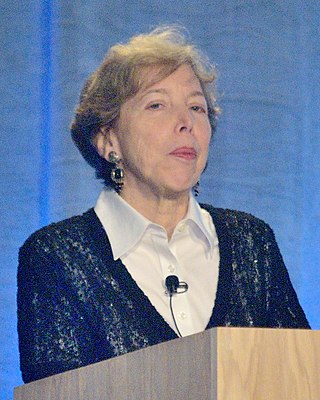Related Research Articles
Alfred Vaino Aho is a Canadian computer scientist best known for his work on programming languages, compilers, and related algorithms, and his textbooks on the art and science of computer programming.

Adele Goldberg is an American computer scientist. She was one of the co-developers of the programming language Smalltalk-80 and of various concepts related to object-oriented programming while a researcher at the Xerox Palo Alto Research Center (PARC), in the 1970s.
SIGPLAN is the Association for Computing Machinery's Special Interest Group on programming languages.
Hsiang-Tsung Kung is a Taiwanese-born American computer scientist. He is the William H. Gates professor of computer science at Harvard University. His early research in parallel computing produced the systolic array in 1979, which has since become a core computational component of hardware accelerators for artificial intelligence, including Google's Tensor Processing Unit (TPU). Similarly, he proposed optimistic concurrency control in 1981, now a key principle in memory and database transaction systems, including MySQL, Apache CouchDB, Google's App Engine, and Ruby on Rails. He remains an active researcher, with ongoing contributions to computational complexity theory, hardware design, parallel computing, routing, wireless communication, signal processing, and artificial intelligence.
Jeffrey David Ullman is an American computer scientist and the Stanford W. Ascherman Professor of Engineering, Emeritus, at Stanford University. His textbooks on compilers, theory of computation, data structures, and databases are regarded as standards in their fields. He and his long-time collaborator Alfred Aho are the recipients of the 2020 Turing Award, generally recognized as the highest distinction in computer science.
In software engineering, profiling is a form of dynamic program analysis that measures, for example, the space (memory) or time complexity of a program, the usage of particular instructions, or the frequency and duration of function calls. Most commonly, profiling information serves to aid program optimization, and more specifically, performance engineering.

Matthias Felleisen is a German-American computer science professor and author. He grew up in Germany and immigrated to the US in his twenties. He received his PhD from Indiana University under the direction of Daniel P. Friedman.

Programming language theory (PLT) is a branch of computer science that deals with the design, implementation, analysis, characterization, and classification of formal languages known as programming languages. Programming language theory is closely related to other fields including mathematics, software engineering, and linguistics. There are a number of academic conferences and journals in the area.

Susan Lois Graham is an American computer scientist. Graham is the Pehong Chen Distinguished Professor Emerita in the Computer Science Division of the Department of Electrical Engineering and Computer Sciences at the University of California, Berkeley.
Thread Level Speculation (TLS), also known as Speculative Multithreading, or Speculative Parallelization, is a technique to speculatively execute a section of computer code that is anticipated to be executed later in parallel with the normal execution on a separate independent thread. Such a speculative thread may need to make assumptions about the values of input variables. If these prove to be invalid, then the portions of the speculative thread that rely on these input variables will need to be discarded and squashed. If the assumptions are correct the program can complete in a shorter time provided the thread was able to be scheduled efficiently.

David Brumley is a professor at Carnegie Mellon University. He is a well-known researcher in software security, network security, and applied cryptography. Prof. Brumley also worked for 5 years as a Computer Security Officer for Stanford University.
In computing, compiler correctness is the branch of computer science that deals with trying to show that a compiler behaves according to its language specification. Techniques include developing the compiler using formal methods and using rigorous testing on an existing compiler.
Barbara G. Ryder is an American Computer Scientist noted for her research on programming languages and more specifically, the theoretical foundations and empirical investigation of interprocedural compile-time analysis.
Susan Beth Horwitz was an American computer scientist noted for her research on programming languages and software engineering, and in particular on program slicing and dataflow-analysis. She had several best paper and an impact paper award mentioned below under awards.

Laurie Hendren was a Canadian computer scientist noted for her research in programming languages and compilers.

Kathleen Shanahan Fisher is an American computer scientist who specializes in programming languages and their implementation.
Csmith is a test case generation tool. It can generate random C programs that statically and dynamically conform to the C99 standard. It is used for stress-testing compilers, static analyzers, and other tools that process C code. It is a free, open source, permissively licensed C compiler fuzzer developed by researchers at the University of Utah. It was previously called Randprog.
Differential testing, also known as differential fuzzing, is a popular software testing technique that attempts to detect bugs, by providing the same input to a series of similar applications, and observing differences in their execution. Differential testing complements traditional software testing, because it is well-suited to find semantic or logic bugs that do not exhibit explicit erroneous behaviors like crashes or assertion failures. Differential testing is sometimes called back-to-back testing.

Grigore Roșu is a computer science professor at the University of Illinois at Urbana-Champaign and a researcher in the Information Trust Institute. He is known for his contributions in runtime verification, the K framework, matching logic, and automated coinduction.
References
- ↑ "Monica Lam PROFESSOR OF COMPUTER SCIENCE". Stanford University. Retrieved March 3, 2016.
- ↑ "Stanford Open Virtual Assistant Lab". oval.cs.stanford.edu. Retrieved January 16, 2022.
- ↑ "Almond -- The Open, Privacy-Preserving Virtual Assistant". almond.stanford.edu. Retrieved June 23, 2020.
- ↑ "CNS Core: Large: Autonomy and Privacy with Open Federated Virtual Assistants". nsf.gov. Retrieved June 23, 2020.
- ↑ Markoff, John (June 6, 2019). "Stanford Team Aims at Alexa and Siri With a Privacy-Minded Alternative". The New York Times. Retrieved June 23, 2020.
- ↑ "The 100 greatest innovations of 2019". Popular Science Magazine.
- ↑ "The Stanford SUIF Group".
- ↑ "Microsoft Research Faculty Summit 2015 - Speakers". microsoft.com. July 9, 2015. Retrieved March 3, 2016.
- ↑ Zimmerman, Eilene (March 18, 2014). "Dispatches from SXSW: Social Media Start-Ups". New York Times. Retrieved March 3, 2016.
Omlet is a mobile sharing and collaboration platform that was introduced at the SXSW Accelerator competition and made it to the finals. It's the first product from MobiSocial, which was founded by Monica Lam, a professor of computer science at Stanford University and the company's chief executive.
- ↑ Tweney, Dylan (March 28, 2014). "This Stanford team is reinventing the entire Internet for just $10M". VentureBeat. Retrieved March 3, 2016.
- ↑ "About - Omlet" . Retrieved March 3, 2016.
Omlet is an Open Messaging Platform, a new standard for mobile messaging applications that leverages the unique attributes of the phone to enable consumers to "share anything, with anyone, anywhere," while owning the data they share.
- ↑ "National Academy of Engineering Elects 86 Members and 18 Foreign Members". nae.edu. Retrieved June 23, 2020.
- ↑ "2018 Award Winners UBC CS 50th Anniversary". cs.ubc.ca. Retrieved June 23, 2020.
- ↑ A Systolic Array Optimizing Compiler (1987); Advisor: H. T. Kung.